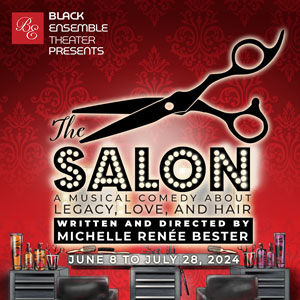
 **** “The Salon”, written and directed by Michelle Renée Bester, is a jukebox musical, having to do with the distinctive role of hair and grooming within African American culture. This show features a mélange of gorgeous voices, fun choreography and dance, and musical numbers with such songs as “Chain of Fools”, “Respect”, “Workin’ Day and Night”, “Work It Out”, “You Make Me Feel”, and Beyoncé’s “Black Parade.” The story is based on a wonderful premise: about how the local salon is a central hub in the black community and can bring a neighborhood together. This combination beauty shop and barber shop is a place where news is shared, stories are swapped, accomplishments are celebrated, and local events are announced. The underlying story is largely a morality play that speaks to various situations of interest to Chicago’s black community, such as the prevalence of street violence, the reality of gentrifying neighborhoods, and the acknowledgement of LGBTQ people.
**** “The Salon”, written and directed by Michelle Renée Bester, is a jukebox musical, having to do with the distinctive role of hair and grooming within African American culture. This show features a mélange of gorgeous voices, fun choreography and dance, and musical numbers with such songs as “Chain of Fools”, “Respect”, “Workin’ Day and Night”, “Work It Out”, “You Make Me Feel”, and Beyoncé’s “Black Parade.” The story is based on a wonderful premise: about how the local salon is a central hub in the black community and can bring a neighborhood together. This combination beauty shop and barber shop is a place where news is shared, stories are swapped, accomplishments are celebrated, and local events are announced. The underlying story is largely a morality play that speaks to various situations of interest to Chicago’s black community, such as the prevalence of street violence, the reality of gentrifying neighborhoods, and the acknowledgement of LGBTQ people.
Teresa (Cynthia Carter) informally manages Bernadette’s Salon, which is located in Chicago in the mostly black neighborhood of Englewood. Because of her age, experience, and inner wisdom, Teresa, otherwise known as Mama T., has become the respected authority at the salon, which has been around since 1974. The other hairstylists are Johnny (Vincent Jordan), who does men’s hair, and Monique (De’Jah Jervai), who does women’s hair. There is also the salon assistant MJ (Jared Brown), who gathers supplies, mixes colors, provides proper sanitation, and does the shampooing.
The big news is that Marie (Rose Marie Simmons), who knows nothing about hair, has become the salon’s new owner. She has decided to change the business away from a rather informal model of operating to one that runs “by the book”, where partying and the soliciting of patrons are no longer being encouraged. When she takes the reigns in 2024, everyone is given a huge binder with all sorts of new rules and regulations, plus fines to enforce them. She specifically tells the stylists that she wants Bernadette’s Salon to become chic. We can only guess that Marie’s use of that word (plus all her remodeling efforts) might mean that she wants to run a more upscale shop. She also hires a new stylist named Erin (Makenzy Jenkins) who has “they/them” pronouns. Other characters in the show include Teresa’s son Jacob (Jaitee Thomas), who is earning his Ph.D. Then there is the Hustleman (Dennis Dent), who happens to run a Hair Contest, where the winning salon owner could be eligible to win a cash prize by featuring some of the most novel and outrageous hairstyles. Ensemble members include: Raeven Carrol, Bryan Nicholas Carter, Ama Kumonu, Shantina Lowe, Traquon Tate, and Kendra Turner.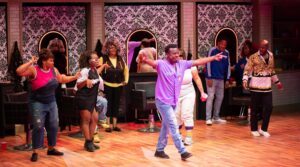
One of the best parts of the show is the set design by Angela Weber Miller. We initially see five stations at a salon, each with a long mirror framed by ten Hollywood lights, five on each side, plus black stylist chairs. There are mustard yellow walls, and most of the mirrors might have photos of loved ones tucked into the frame. Different color smocks hang by each of the stations. When Marie remodels the salon, each of the stations rotates and sports a more contemporary sleek look with long flexible LED lights surrounding each mirror. The shelves of beauty supplies and the brick walls remain intact. Costume design by Evelyn Danner is well done; I liked the matching black smocks and especially the trench coat that the Hustleman wears, sporting deep plastic pockets (from which he sells all sorts of stuff). And, of course, hair and wig design brings together some combination of interesting, weird, authentic, and over-the-top styles.
Choreography by Reneisha Jenkins is nicely done, but I would have liked to see more dance numbers. Music direction is exceptional, as always. Robert Reddrick, the music director, drummer, and arranger, has done a beautiful job making sure that all of the songs are singable by the various characters. The other musicians consist of Adam Sherrod (keys), Myron Cherry (drums), Oscar Brown, Jr. (bass), and Mike Dangeroux (guitar). I should add that the muddiness, distortion, and unevenness of the sound quality in the first act was fixed when the second act began. Plus the sound is much too loud and harsh when we are listening to canned music before the show and during intermission. There’s no way to hold a conversation with a neighbor, and I had to put on my earplugs even before the performance began.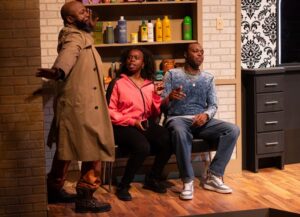
While the underlying story is somewhat too thin and contrived, that’s largely excusable (if not to be expected) when writing a script that tries to pull together so many songs with diverse themes from different artists into one large production. Also forgivable is the fact that the characters are a bit too shallow and distant from the audience. That being said (and without revealing any great secrets), some of the characters do develop and change over time. For example, Marie learns to lighten up in how she handles the business while Johnny learns that being a two-timer is a bad thing and that it’s important to become a more accepting human being. Despite some moments of tragedy, the ending is almost too sweet, especially when everyone has their kumbaya moment and the story is tied up in a bow. But then again, maybe this is what theatregoers really do want to see.
You come to anticipate great things whenever Black Ensemble Theater puts on a show, and I had very high expectations for this musical. However, the show could have been better. It should have generated more enthusiasm and energy from the audience, and I kept waiting for the buildup that would bring us all to our feet. A more realistic plotline, additional music and dance, and a bang-up finale would have had the audience clapping loudly and dancing in the aisles. Unfortunately, audience members didn’t rise to their feet on press night, and there was no accustomed standing ovation. When the show was over and I stood in the lobby, it was evident that the “Wow Factor” was absent. “It was good,” said one person to the next. The question I had to ask myself is what happened to the vitality which I have come to expect from a Jackie Taylor production?
The answer came ironically from founder and producer Jackie Taylor herself, who immediately took the stage when the performance was over and compared the entertainment to “being in church.” Among other things, this means is that everybody is encouraged to join in and share their deeply-felt emotions aloud. But just as importantly, “being in church” means that the pastor has a special obligation to create a message that brings the congregation in and elicits strong emotions from them. Just like a good preacher addressing his flock, theatrical performers in this genre have to play to the audience and make them become a part of the total experience. Specifically, the actors must break down the fourth wall in combination with the music—and drum up the same religious fervor as if we were in a traditional black church. The closest we get to this during the show is when the audience is encouraged to participate during the number “I’m Black and I’m Proud” by James Brown. But as a whole, “The Salon” doesn’t create the excitement it needs to; it doesn’t connect with the audience in the way that it should in order to be an outstanding production. There needs to be more beckoning by the performers to get the audience involved. The music needs to be constantly more rousing, especially towards the end. Yet you should go and see this production if only to listen to all of those glorious voices singing all sorts of fabulous songs.
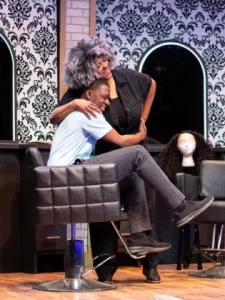 “The Salon: A Musical About Legacy, Love, and Hair” is playing through July 28, 2024, at Black Ensemble Theatre, 4450 N. Clark Street, Chicago.
“The Salon: A Musical About Legacy, Love, and Hair” is playing through July 28, 2024, at Black Ensemble Theatre, 4450 N. Clark Street, Chicago.
Tickets: $56.50-$66.50 (fees included)
Performance schedule:
Saturdays: 3:00 p.m. and 8:00 p.m.
Sundays: 3:00 p.m.
For more information about this show, to purchase tickets, and to learn about their other offerings, visit:
https://blackensembletheater.org/ or call 773-769-4451 or visit the box office at 4450 N. Clark Street, Chicago.
**IMPORTANT INFORMATION**
If you require wheelchair accessibility seating, please call the box office at 773-769-4451.
If you purchase a senior ticket (age 65 and up) or a junior ticket (age 17 or younger) you must provide proof of age at the box office.
Your E-ticket will be sent to your email. For your convenience, you can print your ticket at home or bring it on your mobile device.
Valet parking is available for $13 (cash only).
To see what others are saying, visit www.theatreinchicago.com, go to Review Round-Up and click at ” The Salon: A Musical About Legacy, Love , and hair”.



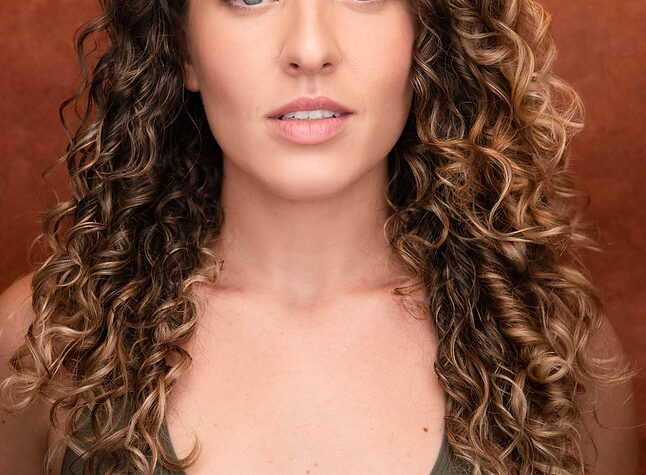

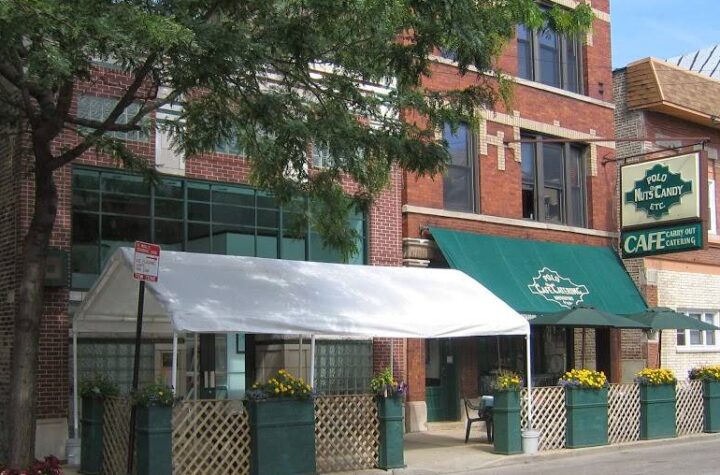
More Stories
“Throbbin Wood” reviewed by Julia W. Rath
“Royko: The Toughest Man In Chicago” revisited review by Julia W. Rath
“Falsettos”